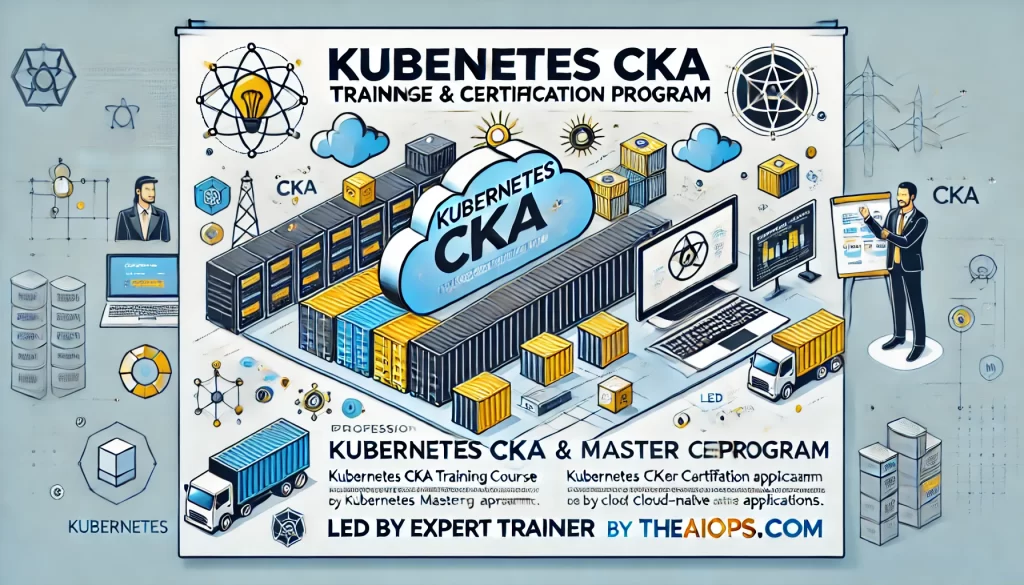
The Kubernetes CKA Training Course & Master Certification Program by theaiops.com is structured to provide IT professionals, DevOps engineers, and system administrators with the knowledge and hands-on skills required to master Kubernetes and prepare for the Certified Kubernetes Administrator (CKA) certification. Led by expert trainer Rajesh Kumar from RajeshKumar.xyz, this program covers the key components of Kubernetes, including cluster setup, workload management, networking, and security configurations. Through practical labs and real-world scenarios, participants gain experience deploying, managing, and troubleshooting Kubernetes clusters, along with the necessary skills to automate container orchestration. This course prepares learners thoroughly for the CKA certification, validating their expertise in Kubernetes and equipping them with the competencies to support, maintain, and optimize containerized applications in production environments.
What is Kubernetes CKA?

Kubernetes is a powerful open-source platform for automating the deployment, scaling, and management of containerized applications. Originally developed by Google, it has become a leading solution for container orchestration, adopted widely by organizations seeking to manage complex applications across private, public, and hybrid cloud environments. The Certified Kubernetes Administrator (CKA) certification, offered by the Cloud Native Computing Foundation (CNCF) and the Linux Foundation, is a globally recognized credential that demonstrates proficiency in managing Kubernetes environments.
This course provides hands-on training in essential Kubernetes tools and components necessary to pass the CKA certification, including:
- kubectl: The primary command-line interface for interacting with Kubernetes clusters, used for deployment, management, and troubleshooting.
- Kubeadm: A tool for quickly setting up Kubernetes clusters, used to initialize the control plane and configure nodes within a cluster.
- Kubernetes API: The core API that serves as the interface for defining, configuring, and querying Kubernetes resources and states.
- Networking: Covering Kubernetes’ native networking model, including service discovery, ingress controllers, and networking plugins.
- Container Runtime: Learn the role of container runtimes (Docker, Containers, CRI-O) in the Kubernetes environment, supporting container lifecycle and management.
Why Kubernetes CKA is Important
As enterprises increasingly adopt cloud-native architectures, the demand for Kubernetes skills is on the rise. The CKA certification demonstrates expertise in Kubernetes, which is critical for managing large-scale applications effectively. Key reasons why Kubernetes CKA is vital include:
- Container Orchestration Leader: Kubernetes is the leading platform for container orchestration, providing powerful capabilities for scaling, high availability, and automated rollouts/rollbacks.
- Industry-Recognized Credential: The CKA certification validates Kubernetes proficiency, making certified professionals more competitive in the job market.
- Enhanced Application Deployment and Management: Kubernetes allows for efficient, automated application deployment, scaling, and lifecycle management, freeing up engineering resources for innovation.
- Multi-Cloud and Hybrid Cloud Compatibility: Kubernetes is designed to be cloud-agnostic, enabling teams to manage applications across diverse cloud and on-premises environments.
- Self-Healing and Resiliency: Kubernetes automatically reschedules failed containers, balances workloads, and restarts unhealthy pods, ensuring high availability.
- Scalability for Enterprise Use: Kubernetes can scale to support extensive environments with thousands of containers, making it suitable for enterprises with demanding workloads.
Course Features
The Kubernetes CKA course offers a comprehensive, hands-on experience tailored to preparing participants for real-world Kubernetes management and the CKA certification exam. Key features include:
- CKA Exam-Focused Curriculum: Covers all CKA exam domains, including cluster management, pod scheduling, networking, storage, security, and troubleshooting.
- Hands-On Labs and Practice Exercises: Each module includes practical labs where participants can set up clusters, configure resources, troubleshoot issues, and practice key Kubernetes tasks.
- Real-World Scenarios and Case Studies: The course integrates scenarios inspired by industry use cases, such as multi-cluster management, disaster recovery, and application migration.
- Lifetime Access to Study Materials: Participants have access to recordings, setup guides, and other resources, allowing them to revisit content as they continue learning.
- Led by Rajesh Kumar, Kubernetes Expert: Rajesh Kumar brings years of Kubernetes experience to the course, providing hands-on instruction, insights, and mentorship.
Training Objectives
By the end of this course, participants will have acquired the skills necessary to manage Kubernetes environments and be fully prepared for the CKA certification exam. Key objectives include:
- Deploying and Configuring Kubernetes Clusters: Set up multi-node clusters with kubeadm, configure control plane and worker nodes, and set up networking and storage.
- Deploying and Managing Applications: Learn to deploy, scale, and update containerized applications, manage deployments and pods, and configure services for networking.
- Understanding Networking and Storage: Configure Kubernetes networking, set up ingress controllers, and manage persistent storage with persistent volumes and volume claims.
- Implementing Security Policies: Set up role-based access control (RBAC), service accounts, and security contexts, ensuring a secure Kubernetes environment.
- Troubleshooting Cluster and Application Issues: Diagnose and resolve common issues related to networking, pod scheduling, resource constraints, and failed deployments.
- Exam Preparation for the CKA: Gain a solid understanding of the CKA exam format, practice with simulated questions, and participate in mock tests.
Target Audience
This course is tailored for IT professionals, DevOps engineers, system administrators, and anyone looking to become a Certified Kubernetes Administrator:
- System Administrators and IT Operations Teams: Responsible for managing infrastructure and looking to incorporate Kubernetes in cloud or on-premises environments.
- DevOps Engineers and CI/CD Professionals: Engineers working on continuous integration and deployment, seeking to leverage Kubernetes for container orchestration.
- Cloud Architects and Infrastructure Engineers: Architects designing scalable, distributed systems who want to deploy and manage applications using Kubernetes.
- Application Developers: Developers looking to deploy applications on Kubernetes and gain insight into containerized application management.
- Network and Security Engineers: Professionals focusing on network and security configurations, looking to implement security policies and manage Kubernetes networking.
Training Methodology
The Kubernetes CKA course uses a blended learning approach, combining theory with hands-on practice to ensure participants gain conceptual understanding and practical expertise:
- Lecture-Based Theory: Each module starts with a lecture on key Kubernetes concepts, architecture, and best practices, providing participants with foundational knowledge.
- Hands-On Labs for Real-World Practice: Each topic includes labs, where participants will configure clusters, create resources, troubleshoot problems, and gain hands-on skills in a controlled environment.
- Project-Based Assignments: Participants complete projects based on real-world scenarios, such as configuring clusters for high availability, setting up application deployments, and implementing disaster recovery strategies.
- Interactive Q&A and Discussion: Regular Q&A and discussion sessions enable participants to clarify concepts, share insights, and collaborate with peers.
- CKA Practice Tests and Mock Exams: Participants can test their knowledge with practice exams, preparing them for the timed, performance-based format of the CKA certification.
Certification Program
Upon completing the course, participants will receive a certification from DevOpsSchool.com, verifying their skills in Kubernetes administration and preparation for the CKA exam.
- Industry-Recognized Certification: The certification demonstrates participants’ Kubernetes management and troubleshooting skills, confirming their readiness for the CKA certification.
- Digital Badge for Professional Profiles: Participants receive a digital badge for LinkedIn, resumes, and other professional networks, showcasing their Kubernetes skills to potential employers.
- Lifetime Access to Certification Resources: Certified participants retain access to course materials, supporting continued learning as they advance their Kubernetes expertise.
Agenda of Kubernetes CKA Training Program
Day 1: Introduction to Kubernetes and Cluster Installation
- Understanding Kubernetes Architecture: Introduction to Kubernetes core components, including API server, controller manager, etcd, scheduler, and worker nodes.
- Setting Up Clusters with kubeadm: Install and initialize Kubernetes clusters with kubeadm, configure nodes, and set up networking.
- Basic Kubernetes Commands with kubectl: Overview of essential kubectl commands, managing namespaces, and working with basic resources.
- Hands-On Lab: Set up a Kubernetes cluster, configure networking, and practice essential kubectl commands to manage nodes and resources.
Day 2: Application Deployment, Networking, and Persistent Storage
- Application Management in Kubernetes: Deploy containerized applications, manage replicas, and roll out updates.
- Service Discovery and Networking: Configure services, ingress controllers, and network policies for secure communication within the cluster.
- Persistent Storage and Data Management: Configure persistent volumes, volume claims, and storage classes to manage application data.
- Hands-On Lab: Deploy a multi-tier application, configure load balancing with services, and set up persistent storage for stateful applications.
Day 3: Security, Troubleshooting, and CKA Exam Preparation
- Securing Kubernetes Environments: Set up role-based access control (RBAC), manage service accounts, and enforce security contexts for pods.
- Troubleshooting Kubernetes Issues: Techniques for identifying and resolving issues with networking, resource allocation, and application failures.
- CKA Exam Preparation: Review CKA exam domains, participate in mock exams, and complete a timed lab simulating the CKA exam environment.
- Hands-On Lab: Participants will configure RBAC policies, troubleshoot common issues, and complete a simulated exam lab to practice CKA-style questions.
Lab Setup
To provide hands-on experience, participants will set up a dedicated lab environment for Kubernetes CKA, which includes:
- Required Software: Kubernetes CLI (kubectl), kubeadm, container runtime (Docker or Containerd), networking plugins compatible with Kubernetes.
- Hardware Requirements: A laptop or desktop with at least 8GB RAM, multi-core processor, and stable internet connection.
- Cloud or Local Deployment Options: Labs can be set up locally or on cloud platforms (AWS, GCP, Azure), giving participants flexibility in choosing their environment.
- Detailed Setup Guide: Step-by-step setup instructions ensure participants are prepared for each lab, providing a seamless, immersive experience.
Trainers
The course is led by Rajesh Kumar, a Kubernetes and cloud infrastructure expert with extensive experience in managing and teaching Kubernetes deployments in production environments. Rajesh’s practical approach ensures participants gain skills they can apply directly in their careers, with expert guidance and mentorship throughout the course.
Frequently Asked Questions (FAQ)
- Who is this Kubernetes CKA course designed for?
- Ideal for system administrators, DevOps engineers, cloud architects, developers, and IT managers.
- Is previous Kubernetes experience required?
- No prior experience is required, but familiarity with containers is beneficial.
- What makes Kubernetes CKA different from other Kubernetes certifications?
- The CKA focuses on administration skills, covering core tasks like cluster management, troubleshooting, and security.
- Is hands-on training included?
- Yes, every module includes hands-on labs to reinforce theoretical concepts.
- Will I be prepared to take the CKA exam after this course?
- Absolutely. The course is aligned with CKA exam objectives and includes mock exams for practice.
- What kinds of tools are covered in this course?
- Participants will work with kubectl, kubeadm, container runtimes (Docker, Containerd), and networking plugins.
- Does this course include Kubernetes security practices?
- Yes, the course covers RBAC, pod security policies, and other security features.
- Can I take this course on a local setup or do I need a cloud environment?
- Labs can be set up either locally or in cloud environments, based on your preference.
- How does Kubernetes help with application scaling?
- Kubernetes automatically scales applications based on resource utilization, ensuring optimal performance.
- Is Kubernetes only used in the cloud?
- No, Kubernetes can be deployed in on-premises environments as well.
- What’s the difference between kubeadm and kubectl?
- kubeadm is used to set up clusters, while kubectl is used for interacting with and managing clusters.
- How does Kubernetes handle high availability?
- Kubernetes automatically distributes workloads and restarts failed containers to maintain availability.
- What industries use Kubernetes?
- Kubernetes is widely used in tech, finance, healthcare, e-commerce, and other industries with large-scale applications.
- Can Kubernetes be used with CI/CD pipelines?
- Yes, Kubernetes integrates well with CI/CD tools, supporting automated deployments and updates.
- Will course materials be accessible after completion?
- Yes, participants have lifetime access to course resources, including videos, guides, and lab setups.
